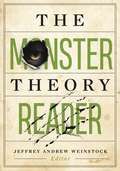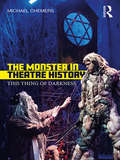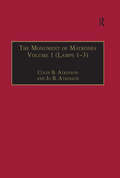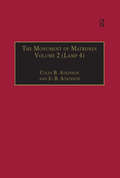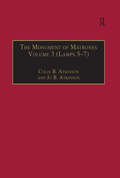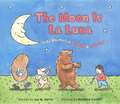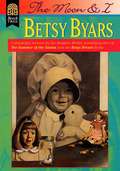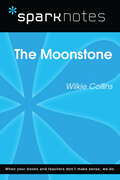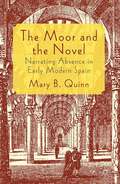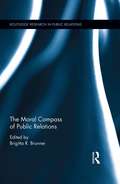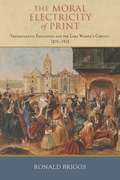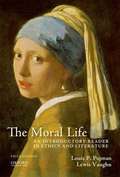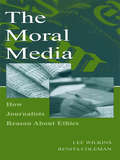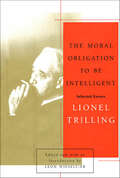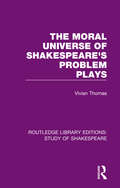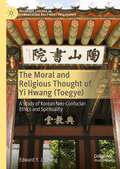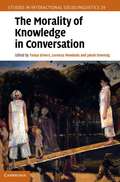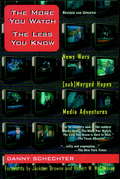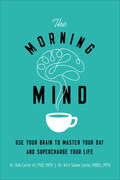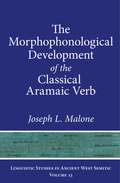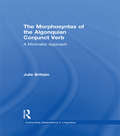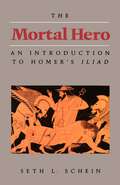- Table View
- List View
The Monster Theory Reader
by Jeffrey Andrew WeinstockA collection of scholarship on monsters and their meaning—across genres, disciplines, methodologies, and time—from foundational texts to the most recent contributions Zombies and vampires, banshees and basilisks, demons and wendigos, goblins, gorgons, golems, and ghosts. From the mythical monstrous races of the ancient world to the murderous cyborgs of our day, monsters have haunted the human imagination, giving shape to the fears and desires of their time. And as long as there have been monsters, there have been attempts to make sense of them, to explain where they come from and what they mean. This book collects the best of what contemporary scholars have to say on the subject, in the process creating a map of the monstrous across the vast and complex terrain of the human psyche.Editor Jeffrey Andrew Weinstock prepares the way with a genealogy of monster theory, traveling from the earliest explanations of monsters through psychoanalysis, poststructuralism, and cultural studies, to the development of monster theory per se—and including Jeffrey Jerome Cohen&’s foundational essay &“Monster Theory (Seven Theses),&” reproduced here in its entirety. There follow sections devoted to the terminology and concepts used in talking about monstrosity; the relevance of race, religion, gender, class, sexuality, and physical appearance; the application of monster theory to contemporary cultural concerns such as ecology, religion, and terrorism; and finally the possibilities monsters present for envisioning a different future. Including the most interesting and important proponents of monster theory and its progenitors, from Sigmund Freud to Julia Kristeva to J. Halberstam, Donna Haraway, Barbara Creed, and Stephen T. Asma—as well as harder-to-find contributions such as Robin Wood&’s and Masahiro Mori&’s—this is the most extensive and comprehensive collection of scholarship on monsters and monstrosity across disciplines and methods ever to be assembled and will serve as an invaluable resource for students of the uncanny in all its guises.Contributors: Stephen T. Asma, Columbia College Chicago; Timothy K. Beal, Case Western Reserve U; Harry Benshoff, U of North Texas; Bettina Bildhauer, U of St. Andrews; Noel Carroll, The Graduate Center, CUNY; Jeffrey Jerome Cohen, Arizona State U; Barbara Creed, U of Melbourne; Michael Dylan Foster, UC Davis; Sigmund Freud; Elizabeth Grosz, Duke U; J. Halberstam, Columbia U; Donna Haraway, UC Santa Cruz; Julia Kristeva, Paris Diderot U; Anthony Lioi, The Julliard School; Patricia MacCormack, Anglia Ruskin U; Masahiro Mori; Annalee Newitz; Jasbir K. Puar, Rutgers U; Amit A. Rai, Queen Mary U of London; Margrit Shildrick, Stockholm U; Jon Stratton, U of South Australia; Erin Suzuki, UC San Diego; Robin Wood, York U; Alexa Wright, U of Westminster.
The Monster in Theatre History: This Thing of Darkness
by Michael ChemersMonsters are fragmentary, uncertain, frightening creatures. What happens when they enter the realm of the theatre? The Monster in Theatre History explores the cultural genealogies of monsters as they appear in the recorded history of Western theatre. From the Ancient Greeks to the most cutting-edge new media, Michael Chemers focuses on a series of ‘key’ monsters, including Frankenstein’s creature, werewolves, ghosts, and vampires, to reconsider what monsters in performance might mean to those who witness them. This volume builds a clear methodology for engaging with theatrical monsters of all kinds, providing a much-needed guidebook to this fascinating hinterland.
The Monstered Self: Narratives of Death and Performance in Latin American Fiction
by Eduardo GonzálezViewing stories and novels from an ethnographic perspective, Eduardo González here explores the relationship between myth, ritual, and death in writings by Borges, Vargas Llosa, Cortázar, and Roa Bastos. He then weaves this analysis into a larger cultural fabric composed of the works of Chaucer, Shakespeare, Joyce, Benjamin, H. G. Wells, Kafka, Poe, and others.What interests González is the signature of authorial selfhood in narrative and performance, which he finds willfully and temptingly disfigured in the works he examines: horrific and erotic, subservient and tyrannical, charismatic and repellent. Searching out the personal image and plot, González uncovers two fundamental types of narrative: one that strips character of moral choice; and another in which characters' choices deprive them of personal autonomy and hold them in ritual bondage to a group. Thus The Monstered Self becomes a study of the conflict between individual autonomy and the stereotypes of solidarity.Written in a characteristically allusive, elliptical style, and drawing on psychoanalysis, religion, mythology, and comparative literature, The Monstered Self is in itself a remarkable performance, one that will engage readers in anthropology, psychology, and cultural history as well as those specifically interested in Latin American narrative.
The Monument of Matrones Volume 1: Essential Works for the Study of Early Modern Women, Series III, Part One, Volume 4 (The Early Modern Englishwoman: A Facsimile Library of Essential Works for the Study of Early Modern Women Series III, Part One #Vols. 4-6)
by Colin B. AtkinsonAs its compiler Thomas Bentley writes, The Monument of Matrones (1582) is a 'domesticall librarie plentifullie stored and replenished'. This 1500-page book is one of a long line of books of secular prayer reaching from the Middle Ages through the sixteenth-century English compilations of prayer and meditations that grew out of the English Reformation. It is unique because it is addressed specifically to women and contains prayers and meditations written by women as well as for them. The Monument helped define women's roles in the Anglican Church and is intertwined with the whole nature of the Protestant Reformation and the place of women in it. The work is divided into seven numbered parts which Bentley titles 'Lamps'. This structural theme is based on a fusion of the imagery of the wise and foolish virgins and their lamps in Matthew 25:1-13 with the vision of the seven lampstands (or seven-branched candlestick) in Rev.1:20-2:1. In this facsimile edition Volume 1 contains Lamps 1-3, Volume 2 contains Lamp 4, and Volume 3 contains Lamps 5-7. The Introductory Note that appears in each of the three volumes provides an overview of the contents of The Monument which will help the reader to appreciate the riches of this immense book. It is also significant in identifying, for the first time, the compiler Thomas Bentley as the churchwarden of St Andrew Holborn, City of London. The copy reproduced in this edition is the British Library copy; where necessary, pages from The Huntington Library copy have been substituted.
The Monument of Matrones Volume 2: Essential Works for the Study of Early Modern Women, Series III, Part One, Volume 5 (The Early Modern Englishwoman: A Facsimile Library of Essential Works for the Study of Early Modern Women Series III, Part One #Vol. 2-6)
by Colin B. AtkinsonAs its compiler Thomas Bentley writes, The Monument of Matrones (1582) is a 'domesticall librarie plentifullie stored and replenished'. This 1500-page book is one of a long line of books of secular prayer reaching from the Middle Ages through the sixteenth-century English compilations of prayer and meditations that grew out of the English Reformation. It is unique because it is addressed specifically to women and contains prayers and meditations written by women as well as for them. The Monument helped define women's roles in the Anglican Church and is intertwined with the whole nature of the Protestant Reformation and the place of women in it. The work is divided into seven numbered parts which Bentley titles 'Lamps'. This structural theme is based on a fusion of the imagery of the wise and foolish virgins and their lamps in Matthew 25:1-13 with the vision of the seven lampstands (or seven-branched candlestick) in Rev.1:20-2:1. In this facsimile edition Volume 1 contains Lamps 1-3, Volume 2 contains Lamp 4, and Volume 3 contains Lamps 5-7. The Introductory Note that appears in each of the three volumes provides an overview of the contents of The Monument which will help the reader to appreciate the riches of this immense book. It is also significant in identifying, for the first time, the compiler Thomas Bentley as the churchwarden of St Andrew Holborn, City of London. The copy reproduced in this edition is the British Library copy; where necessary, pages from The Huntington Library copy have been substituted.
The Monument of Matrones Volume 3: Essential Works for the Study of Early Modern Women, Series III, Part One, Volume 6 (The Early Modern Englishwoman: A Facsimile Library of Essential Works for the Study of Early Modern Women Series III, Part One)
by Colin B. AtkinsonAs its compiler Thomas Bentley writes, The Monument of Matrones (1582) is a 'domesticall librarie plentifullie stored and replenished'. This 1500-page book is one of a long line of books of secular prayer reaching from the Middle Ages through the sixteenth-century English compilations of prayer and meditations that grew out of the English Reformation. It is unique because it is addressed specifically to women and contains prayers and meditations written by women as well as for them. The Monument helped define women's roles in the Anglican Church and is intertwined with the whole nature of the Protestant Reformation and the place of women in it. The work is divided into seven numbered parts which Bentley titles 'Lamps'. This structural theme is based on a fusion of the imagery of the wise and foolish virgins and their lamps in Matthew 25:1-13 with the vision of the seven lampstands (or seven-branched candlestick) in Rev.1:20-2:1. In this facsimile edition Volume 1 contains Lamps 1-3, Volume 2 contains Lamp 4, and Volume 3 contains Lamps 5-7. The Introductory Note that appears in each of the three volumes provides an overview of the contents of The Monument which will help the reader to appreciate the riches of this immense book. It is also significant in identifying, for the first time, the compiler Thomas Bentley as the churchwarden of St Andrew Holborn, City of London. The copy reproduced in this edition is the British Library copy; where necessary, pages from The Huntington Library copy have been substituted.
The Moon Is La Luna
by Jay M. HarrisThis book is full of monos, ratons, and osos. What’s that, you say? You don’t know what a mono is? What about a rio, some pelo, or even an árbol? No? Still no idea? You should read this libro, then. By the time you finish, you’ll be able to recognize and understand more than fifty simple Spanish words. You’ll be saying, "Mas, por favor!” You may even ask your papá to buy you a gato or pato. (But not your papa. Potatoes can’t buy pets. )
The Moon and I
by Betsy ByarsWhile describing her humorous adventures with a blacksnake, Betsy Byars recounts childhood anecdotes and explains how she writes a book.
The Moonstone (SparkNotes Literature Guide Series)
by SparkNotesThe Moonstone (SparkNotes Literature Guide) by Wilkie Collins Making the reading experience fun! Created by Harvard students for students everywhere, SparkNotes is a new breed of study guide: smarter, better, faster. Geared to what today's students need to know, SparkNotes provides: *Chapter-by-chapter analysis *Explanations of key themes, motifs, and symbols *A review quiz and essay topicsLively and accessible, these guides are perfect for late-night studying and writing papers
The Moor and the Novel
by Mary B. QuinnThis book reveals fundamental connections between nationalist violence, religious identity, and the origins of the novel in the early modern period. Through fresh interpretations of music, literature, and history it argues that the expulsion of the Muslim population created a historic and artistic aperture that was addressed in new literary forms.
The Moral Compass of Public Relations (Routledge Research in Public Relations)
by Brigitta R. BrunnerThe civic and moral responsibilities of public relations are hotly contested topics. While many researchers call for focusing on ethics in public relations, they concentrate on ethics in relation to how people do their jobs. In actuality, emphasis should move beyond professional codes of ethics to include general morality and citizenship. Currently, as the profession receives greater scrutiny, it is important to be aware of the value of public relations in the community. This book centers on four areas of public relations’ conscience in order to examine its role in morality and citizenship: civic professionalism, corporate social responsibility, ethics, and public communication. This approach will help to answer the question of what is public relations’ responsibility to the public good.
The Moral Electricity of Print: Transatlantic Education and the Lima Women's Circuit, 1876-1910
by Ronald BriggsMoral electricity—a term coined by American transcendentalists in the 1850s to describe the force of nature that was literacy and education in shaping a greater society. This concept wasn't strictly an American idea, of course, and Ronald Briggs introduces us to one of the greatest examples of this power: the literary scene in Lima, Peru, in the nineteenth century.As Briggs notes in the introduction to The Moral Electricity of Print, "the ideological glue that holds the American hemisphere together is a hope for the New World as a grand educational project combined with an anxiety about the baleful influence of a politically and morally decadent Old World that dominated literary output through its powerful publishing interests." The very nature of living as a writer and participating in the literary salons of Lima was, by definition, a revolutionary act that gave voice to the formerly colonized and now liberated people. In the actions of this literary community, as men and women worked toward the same educational goals, we see the birth of a truly independent Latin American literature.
The Moral Electricity of Print: Transatlantic Education and the Lima Women's Circuit, 1876-1910
by Ronald BriggsBest Nineteenth-Century Book Award Winner, 2018, Latin American Studies Association Nineteenth-Century Section Moral electricity—a term coined by American transcendentalists in the 1850s to describe the force of nature that was literacy and education in shaping a greater society. This concept wasn't strictly an American idea, of course, and Ronald Briggs introduces us to one of the greatest examples of this power: the literary scene in Lima, Peru, in the nineteenth century. As Briggs notes in the introduction to The Moral Electricity of Print, "the ideological glue that holds the American hemisphere together is a hope for the New World as a grand educational project combined with an anxiety about the baleful influence of a politically and morally decadent Old World that dominated literary output through its powerful publishing interests." The very nature of living as a writer and participating in the literary salons of Lima was, by definition, a revolutionary act that gave voice to the formerly colonized and now liberated people. In the actions of this literary community, as men and women worked toward the same educational goals, we see the birth of a truly independent Latin American literature.
The Moral Life: An Introductory Reader in Ethics and Literature (Fifth Edition)
by Louis P. Pojman Lewis VaughnIdeal for introductory ethics courses, The Moral Life: An Introductory Reader in Ethics and Literature, Fifth Edition, brings together an extensive and varied collection of ninety-one classical and contemporary readings on ethical theory and practice. Integrating literature with philosophy inan innovative way, this unique anthology uses literary works to enliven and make concrete the ethical theory or applied issues addressed. It also emphasizes the personal dimension of ethics, which is often ignored or minimized in ethics anthologies. The readings are enhanced by chapterintroductions, study questions, suggestions for further reading, and biographical sketches. The fifth edition adds ten new readings, eight of which appear in two new chapters: Feminist Ethics and the Ethics of Care and Global Economic Justice. An updated Companion Website at www. oup. com/us/pojman provides self-quizzes, essay questions, and helpful links for students and reading summaries,a test bank, and PowerPoint-based lecture slides for instructors.
The Moral Media: How Journalists Reason About Ethics (Routledge Communication Series)
by Lee Wilkins Renita ColemanThe Moral Media provides readers with preliminary answers to questions about ethical thinking in a professional environment. Representing one of the first publications of journalists' and advertising practitioners' response to the Defining Issues Test (DIT), this book compares thinking about ethics by these two groups with the thinking of other professionals.This text is divided into three parts:*Part I includes chapters that explain the DIT and place it within the larger history of three fields: psychology, philosophy, and mass communication. It also provides both a statistical (quantitative) and narrative (qualitative) analysis of journalists' responses to the DIT.*Part II adds to scholarship theory building in these three disciplines and makes changes in the DIT that adds an element of visual information processing to the test.*Part III explores the larger meaning of this effort overall and links the results to theory and practice in these three fields. The Moral Media pursues connections among various intellectual disciplines, between the academy and the profession of journalism, and among those who believe that what journalists do is essential. As a result, this book is appropriate for aspiring journalists; scholars in journalism and mass communication; psychologists, particularly those interested in human development and behavior; and philosophers.
The Moral Obligation to Be Intelligent: Selected Essays
by Lionel TrillingA landmark reissue of a great teacher's finest workLionel Trilling was, during his lifetime, generally acknowledged to be one of the finest essayists in the English language, the heir of Hazlitt and the peer of Orwell. Since his death in 1974, his work has been discussed and hotly debated, yet today, when writers and critics claim to be "for" or "against" his interpretations, they can hardly be well acquainted with them, for his work has been largely out of print for years.With this re-publication of Trilling's finest essays, Leon Wieseltier offers readers of many new generations a rich overview of Trilling's achievement. The essays collected here include justly celebrated masterpieces--on Mansfield Park and on "Why We Read Jane Austen"; on Twain, Dos Passos, Hemingway, Isaac Babel; on Keats, Wordsworth, Eliot, Frost; on "Art and Neurosis"; and the famous Preface to Trilling's book The Liberal Imagination.This exhilarating work has much to teach readers who may have been encouraged to adopt simpler systems of meaning, or were taught to exchange the ideals of reason and individuality for those of enthusiasm and the false romance of group identity. Trilling's remarkable essays show a critic who was philosophically motivated and textually responsible, alive to history but not in thrall to it, exercised by art but not worshipful of it, consecrated to ideas but suspicious of theory.
The Moral Universe of Shakespeare's Problem Plays (Routledge Library Editions: Study of Shakespeare)
by Vivian ThomasWhat is it that makes Shakespeare’s problem plays problematic? Many critics have sought for the underlying vision or message of these puzzling and disturbing dramas. Originally published in 1987, the key to Viv Thomas’s new synthesis of the plays is the idea of fracture and dissolution in the universe. From the collapse of ‘degree’ in Troilus and Cressida to the corruption at the heart of innocence in Measure for Measure, to the puzzling status of virtue and valour in All’s Well, the most obvious feature of these plays in their capacity to prompt new questions. In a detailed discussion of each play in turn, the author traces the dominant themes that both distinguish and unite them, and provides numerous insights into the sources, background, texture and morality of the plays.
The Moral and Religious Thought of Yi Hwang: A Study of Korean Neo-Confucian Ethics and Spirituality (Palgrave Studies in Comparative East-West Philosophy)
by Edward Y. ChungThis book presents Yi Hwang (1501–1570)—better known by his pen name, Toegye—Korea’s most eminent Confucian philosopher. It is a pioneering study of Toegye’s moral and religious thought that discusses his holistic ideas and experiences as a scholar, thinker, and spiritual practitioner. This study includes Toegye’s major texts, essays, letters, and biographies. Edward Chung explains key concepts, original quotations, annotated notes, and thought-provoking comments to bring this monumental thinker and his work to life. Chung also considers comparative and interreligious perspectives and their contemporary relevance. By offering groundbreaking insights into Neo-Confucianism, this book sheds fresh light on the breadth and depth of Toegye’s ethics and spirituality, and is an important source for scholars and students in Korean and Confucian studies and comparative philosophy and religion.
The Morality of Knowledge in Conversation (Studies in Interactional Sociolinguistics)
by Lorenza Mondada Jakob Steensig Tanya StiversEach time we take a turn in conversation we indicate what we know and what we think others know. However, knowledge is neither static nor absolute. It is shaped by those we interact with and governed by social norms - we monitor one another for whether we are fulfilling our rights and responsibilities with respect to knowledge, and for who has relatively more rights to assert knowledge over some state of affairs. This book brings together an international team of leading linguists, sociologists and anthropologists working across a range of European and Asian languages to document some of the ways in which speakers manage the moral domain of knowledge in conversation. The volume demonstrates that if we are to understand how speakers manage issues of agreement, affiliation and alignment - something clearly at the heart of human sociality - we must understand the social norms surrounding epistemic access, primacy and responsibilities.
The More You Watch the Less You Know
by Robert Mcchesney Danny Schechter Jackson BrowneA candid insider's tale of how the media really works and why it doesn't work the way it should, The More You Watch, The Less You Know has emerged as a key catalyst in the debate on media reform. The More You Watch, The Less You Know recounts Schechter's media adventures, from when he was "Danny Schechter the News Dissector" on Boston's WBCN radio, to his stints as a producer at ABC's 20/20 and CNN, to his personal odyssey chronicling the anti-Apartheid revolution in South Africa, to his development of innovative programming like South Africa Now and Rights & Wrongs as an independent producer. In this age of telecommunications bills and media mergers, The More You Watch, The Less You Know is an insider's passionate plea for freedom of the (electronic) press.
The Morning Mind: Use Your Brain to Master Your Day and Supercharge Your Life
by Rob Carter III Kirti Salwe CarterUnleash positive thinking and productive imagination, and flip negative thoughts and behaviors into a lifetime to improve every aspect of your life—each morning, one day at a time.Bad habits. Bad feelings. Bad mornings that turn into regrettable days. Banish them all with simple brain hacks that flip negative thoughts and behaviors into positive, productive ones.The Morning Mind makes it easy. Based on findings from neuroscience and medicine, Dr. Robert Carter and Dr. Kirti Carter help you tamp down on the fear-driven reptile brain and tap into the part linked to thinking and imagination.With topics ranging from diet and hydration to exercise and meditation, you&’ll find ideas for activating your brain—and improving every aspect of your life:Restore healthy cycles of waking and sleepingBlock harmful cortisol hormonesBoost mental performanceCreate calmer morningsDevelop self-disciplineStimulate creativityImprove your leadership skillsInstead of dragging through your day, learn to wake up refreshed, recharge regularly, and live better than ever. From the moment the alarm clock rings, The Morning Mind helps you greet each day with gusto.
The Morphophonological Development of the Classical Aramaic Verb (Linguistic Studies in Ancient West Semitic #13)
by Joseph L. MaloneThis book offers a diachronic and synchronic account of the verb morphology and phonology of Aramaic from its initial appearance early in the first millennium B.C.E. until the second millennium C.E. Aramaic, a subfamily of Semitic, is closely related to Hebrew and the other Canaanite languages; together, the two subfamilies of Aramaic and Canaanite constitute the northwest branch of the Semitic phylum. In this study, Joseph L. Malone focuses on thirteen dialects of Aramaic, chosen from a candidate list of approximately twice that number. The specific varieties of Aramaic examined here are chosen to provide an optimal chronological and geographical range. In a similar vein, the finite verb serves as the subject of this study, based on the assumption that a thorough treatment of the verb will asymptomatically involve most of the patterns and processes that hold for the grammar as a whole. The tools of this study are drawn from standard generative linguistics, though care is taken to explicate these in more traditional terms where it is deemed necessary. This book is essential reading for linguists who study the Semitic language families, and in particular those interested in Northwest Semitic languages.
The Morphophonological Development of the Classical Aramaic Verb (Linguistic Studies in Ancient West Semitic)
by Joseph L. MaloneThis book offers a diachronic and synchronic account of the verb morphology and phonology of Aramaic from its initial appearance early in the first millennium B.C.E. until the second millennium C.E. Aramaic, a subfamily of Semitic, is closely related to Hebrew and the other Canaanite languages; together, the two subfamilies of Aramaic and Canaanite constitute the northwest branch of the Semitic phylum. In this study, Joseph L. Malone focuses on thirteen dialects of Aramaic, chosen from a candidate list of approximately twice that number. The specific varieties of Aramaic examined here are chosen to provide an optimal chronological and geographical range. In a similar vein, the finite verb serves as the subject of this study, based on the assumption that a thorough treatment of the verb will asymptomatically involve most of the patterns and processes that hold for the grammar as a whole. The tools of this study are drawn from standard generative linguistics, though care is taken to explicate these in more traditional terms where it is deemed necessary. This book is essential reading for linguists who study the Semitic language families, and in particular those interested in Northwest Semitic languages.
The Morphosyntax of the Algonquian Conjunct Verb: A Minimalist Approach (Outstanding Dissertations in Linguistics)
by Julie BrittainThe book investigates the synatctic distribution of the Algonquian Conjuct verb from the theoretical perspective of the Minimalist Program.
The Mortal Hero: An Introduction to Homer's <i>Iliad</i>
by Seth L. ScheinFrom the Preface:This book is addressed mainly to non-specialist readers who do not know Greek and who read, study, or teach the Iliad in translation; it also is meant for classical scholars whose professional specialization has prevented them from keeping abreast of recent work on Homer. It is grounded in technical scholarship, to which it constantly referes and is intended to contribute, and I hope that even Homeric specialists will find ideas and interpretations to interest them. I have tried to present clearly what seem to me the most valuable results of modern research and criticism of the Iliad while setting forth my own views. My goal has been to interpret the poem as much as possible on its own mythological, religious, ethical, and artistic terms. The topics and problems I focus on are those that have arisen most often and most insistently when I have thought the poem, in translation and in the original, as I have done every year since 1968. This book is a literary study of the Iliad. I have not discussed historical, archaeologoical, or even linguistic questions except where they are directly relevant to literary interpretation. Throughout I have emphasized what is thematically, ethically, and artistically distinctive in the Iliad in contrast to the conventions of the poetic tradition of which it is an end product.
